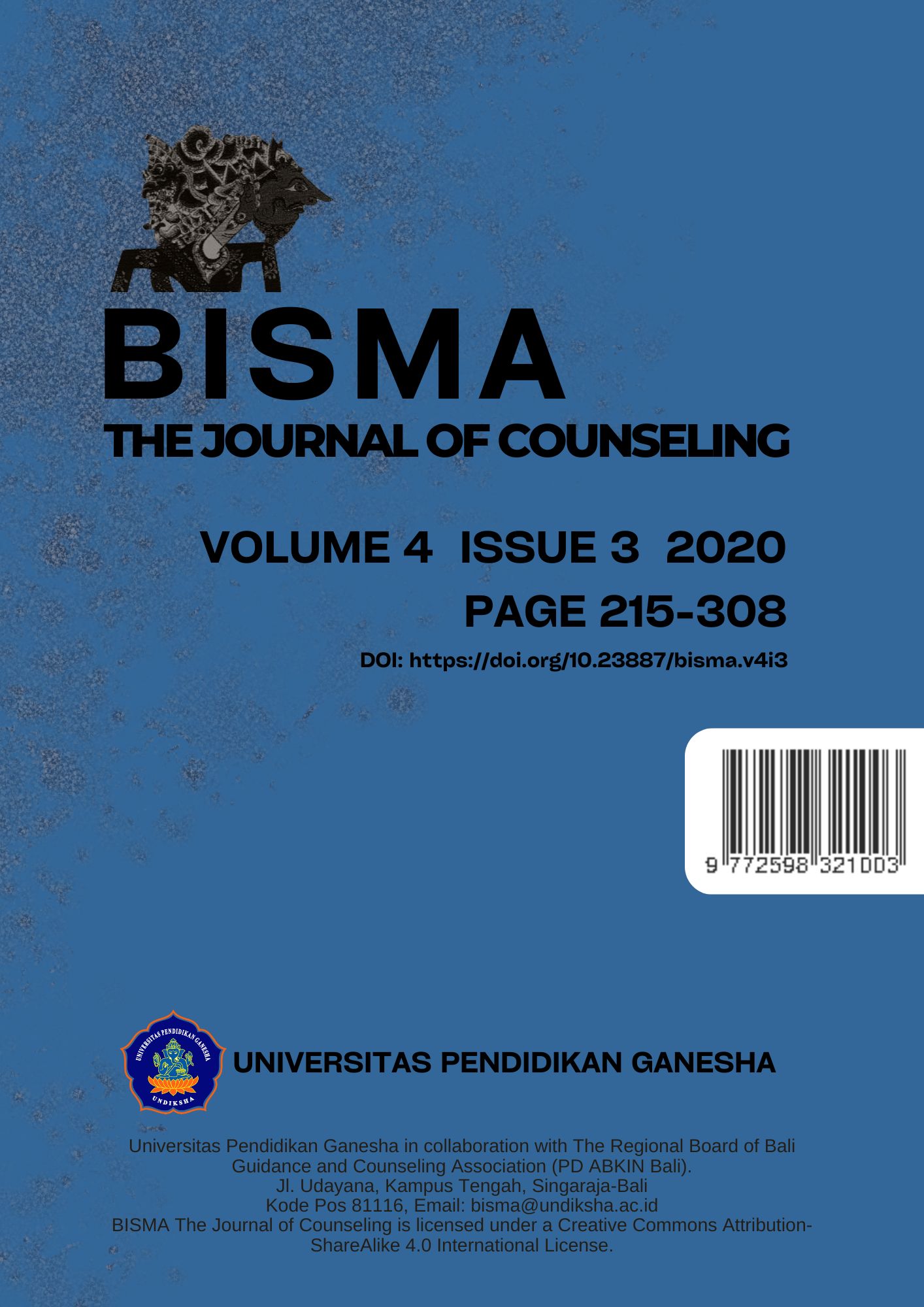The Provision of Tele-Counseling in Malaysia: An In-Depth Qualitative Analysis
DOI:
https://doi.org/10.23887/bisma.v4i3.30694Keywords:
Data Aanalysis, tele-counseling, qualitative research, MalaysiaAbstract
Online counseling refers to the provision of therapeutic helping services which manipulated the electronic communication technology between a professional counselor with his or her clients via devices such as telephone, e-mail, and other social media platforms. One of the services that is getting more attention right now in Malaysia is the tele-counseling which refers to the provision of counseling service via telephone. However, since the policy on its’ provision is still inexistence, this new trend of providing counseling service is still not being accepted by the conventional practitioners, who are still believed in the face-to-face communication in order to establish an effective counseling relationship. The objective of this concept paper is to explore views of local counseling experts on the feasibility of tele-counseling provision. The thematic analysis from research data revealed three main themes namely, (i) acceptence towards tele-counseling; (ii) advantages of tele-counseling; and (iii) limitations of tele-counseling. The result of this initial study pointed out that tele-counseling can be considered as an alternative provision for the future. However, in Malaysia, more guiding policies and directives need to be developed so that the delivery of this services in the future will not violate the ethics of the profession which in turn will jeopardize the professionalism of the field.References
American Counseling Association. 1999. Code Of Ethics and Standard of Practice. Washington DC: Author.
American Psychological Association. 1997. APA statement on services by telephone, teleconferencing, and Internet. http://www.apa.org/ethics/stmnt01.html. [12 Julai 2019]
Civin, M. 2000. Male, Female, e-mail, The Struggle for Relatedness in a Paranoid Society. New York: Other Press.
Corey, G. 2013. Theory and practice of counseling and psychotherapy. Canada: United State.
Creswell, J. W. 2014. Research design: Qualitative, quantitative, and mixed methods approaches (4th) ed.). USA: Sage.
Dini, F., 2016. Tesis of counseling strategies based on multicultural community welfare in Malaysia. Selangor: Universiti Kebangsaan Malaysia.
Glaser, B. G., & Peshkin. 1992. Basics of grounded theory. Chicago: Adline.
Glaser and Strauss, 1967. The discovery of grounded theory: Strategies for qualitative research. Chicago: Adline.
Hanley, T. 2009. The working alliance in online therapy with young people: Preliminary findings. British Journal of Guidance & Counselling, 37, 257-269.
Kim, J., & de Dear, R. 2013. Workspace satisfaction: The privacy-communication trade-off in open-plan offices. Journal of Environmental Psychology 36: 18-26.
Leibert, T., Archer Jr., J., Munson, J., & York, G. (2006). An exploratory study of client perceptions of Internet counselling and the therapeutic alliance. Journal of Mental Health Counselling, 28(1), 69-83.
Mohd Nor Mamat. 2000. Era Maklumat dari Perspektif Islam. Pemikir, 15-26.
Murphy, L. J., & Mitchell, D. L. 1998. When writing helps to heal: e-mail as therapy. British
Journal of Guidance and Counselling, 26: 21-32.
National Board for Certified Counselors. 1997. Standards for the ethical practice of Web Counselling. NBCC.
National Board for Certified Counselors and Center for Credentialing and Education. 2005. The practice of internet counseling. Greensboro, NC: Author.
Norafida Ithnin & Othman Ibrahim. 2000. E-pembelajaran secara langsung (live e-learning)
dalam pembelajaran maya. Paper Presented at Konvensyen Pendidikan UTM 2000.
Nor Ba’yah Abdul Kadir & Yahaya Mahamood. 2001. Kesejahteraan Psikologi: E-Kaunseling sebagai satu kaedah segera mencapai bantuan dalam menyelesaikan masalah psikologikal. Jurnal Psikologi dan Pembangunan Manusia, 17, 225-242.
Pelling, N. 2009. The use of email and internet in counselling and psychological services. What practitioners need to know. Couselling, Psychotheraphy and Health, 5(1): 1-15.
Lau Poh Li, Rafidah Aga Mohd Jaladin & Haslee Sharil Abdullah. 2013. Understanding the Two Sides of Online Counseling and Their Ethical and Legal Ramifications. Procedia-Social and Behavioral Sciences, 103: 1243-1251.
Ramsden, D. 2011. Experience Telephone counsellors: experiences of the physical environment in a non-face-to-face counselling servicees. Counselling Autralia. 12: 26-36.
Richards, D., & Vigan, N. (2012). Online Counseling. In Y. Zheng (Ed.), Encyclopedia of Cyber Behavior, 1: 699-713.
Rosenfield, M. 2002. Electronic Technology for Social Work Education and Practice: The application of Telephone Technology to Counselling. Journal of Technology in Human Services, 20: 173-181.
Suriati, G. and A. Colonius, 2008. Query and interpretation of qualitative information in geography research: Experience from women's family welfare wellness review. Journal of Human and Society, 16(11): 156-179.
Tyler, M. J., & Sabella, R. A. 2004. Using technology to improve counseling practice: A primer for the 21st century. Alexandria, VA: American Counseling Association.
Yin, R. K. 2014. Case study research: Design and methods. 5th Edition. Thousand Oaks, California: SAGE Publications Inc.
Young, K. S. 2005. An Empirical Examination of Client Attitudes Towards Onlines Counselling. CyberPsychology & Behavior, 8:172-177.









